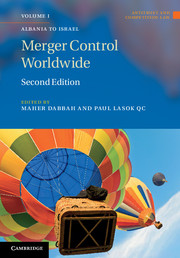Book contents
- Frontmatter
- Contents
- Preface
- List of Contributors
- Table of cases
- Table of Legislation and Official Guidance
- Introduction
- Albania
- Argentina
- Armenia (Republic of Armenia)
- Australia
- Austria
- Barbados
- Belgium
- Bosnia and Herzegovina
- Brazil
- Bulgaria (Republic of Bulgaria)
- Canada
- Chile
- China*
- Costa Rica
- Croatia
- Cyprus (Republic of Cyprus)
- Czech Republic
- Denmark
- Estonia
- European Economic Area
- European Union
- Finland
- France
- Germany (Federal Republic of Germany)
- Greece
- Hong Kong
- Hungary
- Iceland
- India
- Indonesia (Republic of Indonesia)
- Ireland
- Israel
- Italy
- Japan
- Kenya
- Korea
- Latvia
- Lithuania
- Macedonia (Republic of Macedonia)
- Malta
- Mexico
- Netherlands (The Netherlands)
- New Zealand
- Norway
- Pakistan
- Peru
- Philippines (Republic of the Philippines)
- Poland
- Portugal
- Romania
- Russia
- Serbia
- Singapore
- Slovakia (Slovak Republic)
- Slovenia
- South Africa
- Spain
- Sri Lanka
- Sweden
- Switzerland
- Taiwan
- Thailand
- Tunisia (Republic of Tunisia)
- Turkey
- Ukraine
- United Kingdom
- United States of America
- Uzbekistan
- Venezuela
- Zambia
- Index
Korea
Published online by Cambridge University Press: 05 November 2014
- Frontmatter
- Contents
- Preface
- List of Contributors
- Table of cases
- Table of Legislation and Official Guidance
- Introduction
- Albania
- Argentina
- Armenia (Republic of Armenia)
- Australia
- Austria
- Barbados
- Belgium
- Bosnia and Herzegovina
- Brazil
- Bulgaria (Republic of Bulgaria)
- Canada
- Chile
- China*
- Costa Rica
- Croatia
- Cyprus (Republic of Cyprus)
- Czech Republic
- Denmark
- Estonia
- European Economic Area
- European Union
- Finland
- France
- Germany (Federal Republic of Germany)
- Greece
- Hong Kong
- Hungary
- Iceland
- India
- Indonesia (Republic of Indonesia)
- Ireland
- Israel
- Italy
- Japan
- Kenya
- Korea
- Latvia
- Lithuania
- Macedonia (Republic of Macedonia)
- Malta
- Mexico
- Netherlands (The Netherlands)
- New Zealand
- Norway
- Pakistan
- Peru
- Philippines (Republic of the Philippines)
- Poland
- Portugal
- Romania
- Russia
- Serbia
- Singapore
- Slovakia (Slovak Republic)
- Slovenia
- South Africa
- Spain
- Sri Lanka
- Sweden
- Switzerland
- Taiwan
- Thailand
- Tunisia (Republic of Tunisia)
- Turkey
- Ukraine
- United Kingdom
- United States of America
- Uzbekistan
- Venezuela
- Zambia
- Index
Summary
Relevant legislation and statutory standards
The primary competition legislation in Korea is the Monopoly Regulation and Fair Trade Law (the FTL), which was enacted in April 1980. The FTL contains various sections which regulate particular aspects of competitive behaviour of companies. As major examples, the FTL regulates and covers, among other things, the following areas of activity:
monopolies, monopolisation and abuse of monopolistic power in general;
unfair collaborative activity;
business combination, including mergers and acquisitions; and
unfair trade practices.
Decision-making bodies and enforcement authority(ies)
The main competition authority in Korea is the Korea Fair Trade Commission (KFTC), which is authorised under the FTL to oversee the enforcement of that legislation. Among other things, the KFTC is involved in formulating and administering competition policy in Korea. It also deliberates, decides and handles competition cases through its decision-making process.
The KFTC consists of a committee (‘the Committee’), which is a decision-making body, and a secretariat (‘the Secretariat’), which is an administering body. There are currently nine commissioners in the Committee, ive of whom are government oficials (including the Chairman and Vice-Chairman of the KFTC and three standing commissioners) and four of whom are non-standing. The Secretariat performs activities such as investigating competition issues and enforcing decisions made by the Committee.
- Type
- Chapter
- Information
- Merger Control Worldwide , pp. 873 - 890Publisher: Cambridge University PressPrint publication year: 2012



